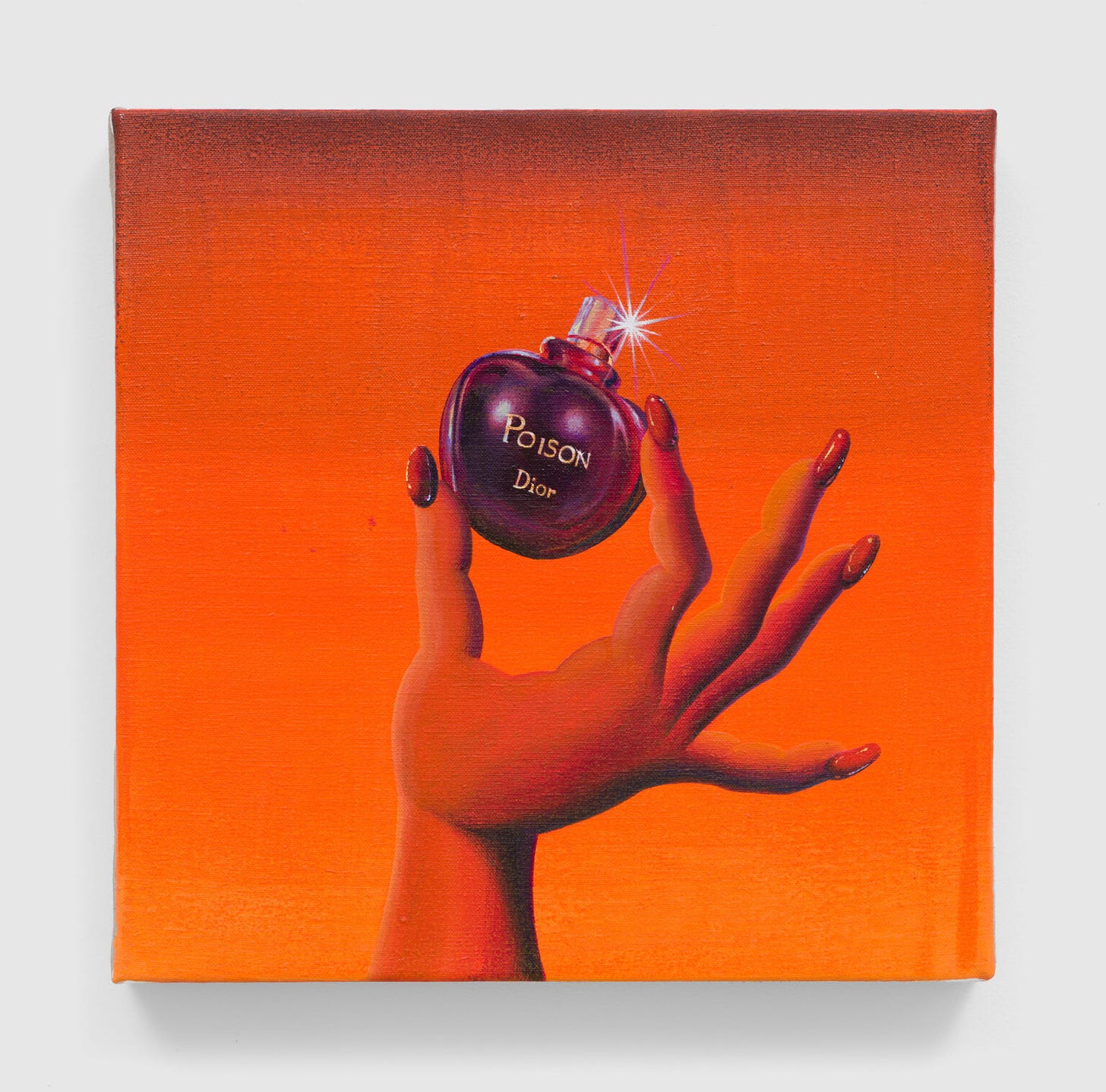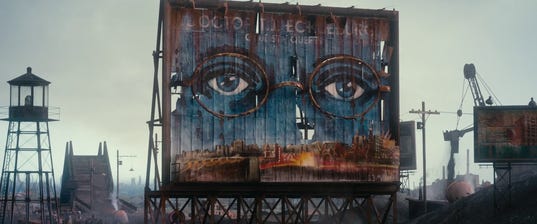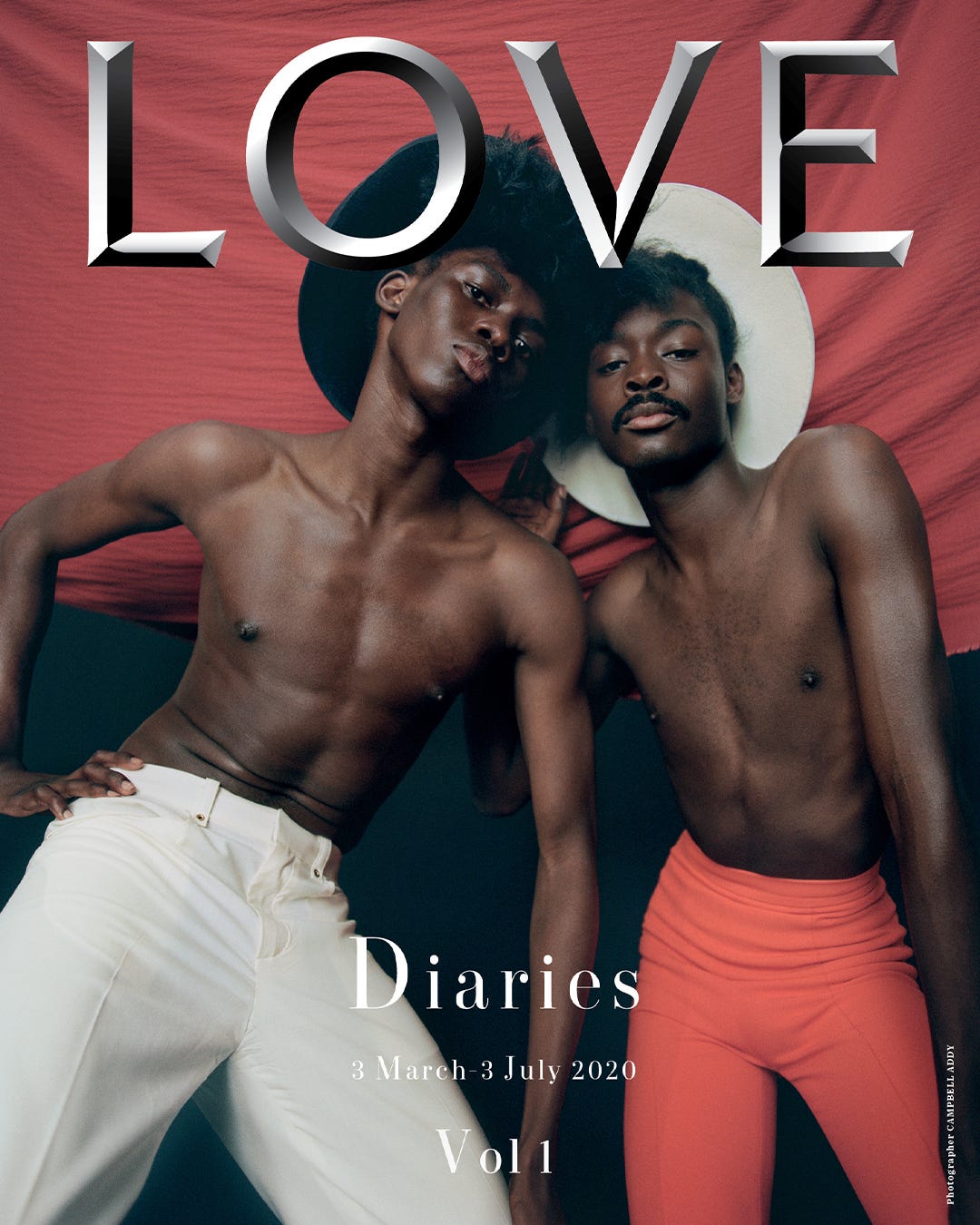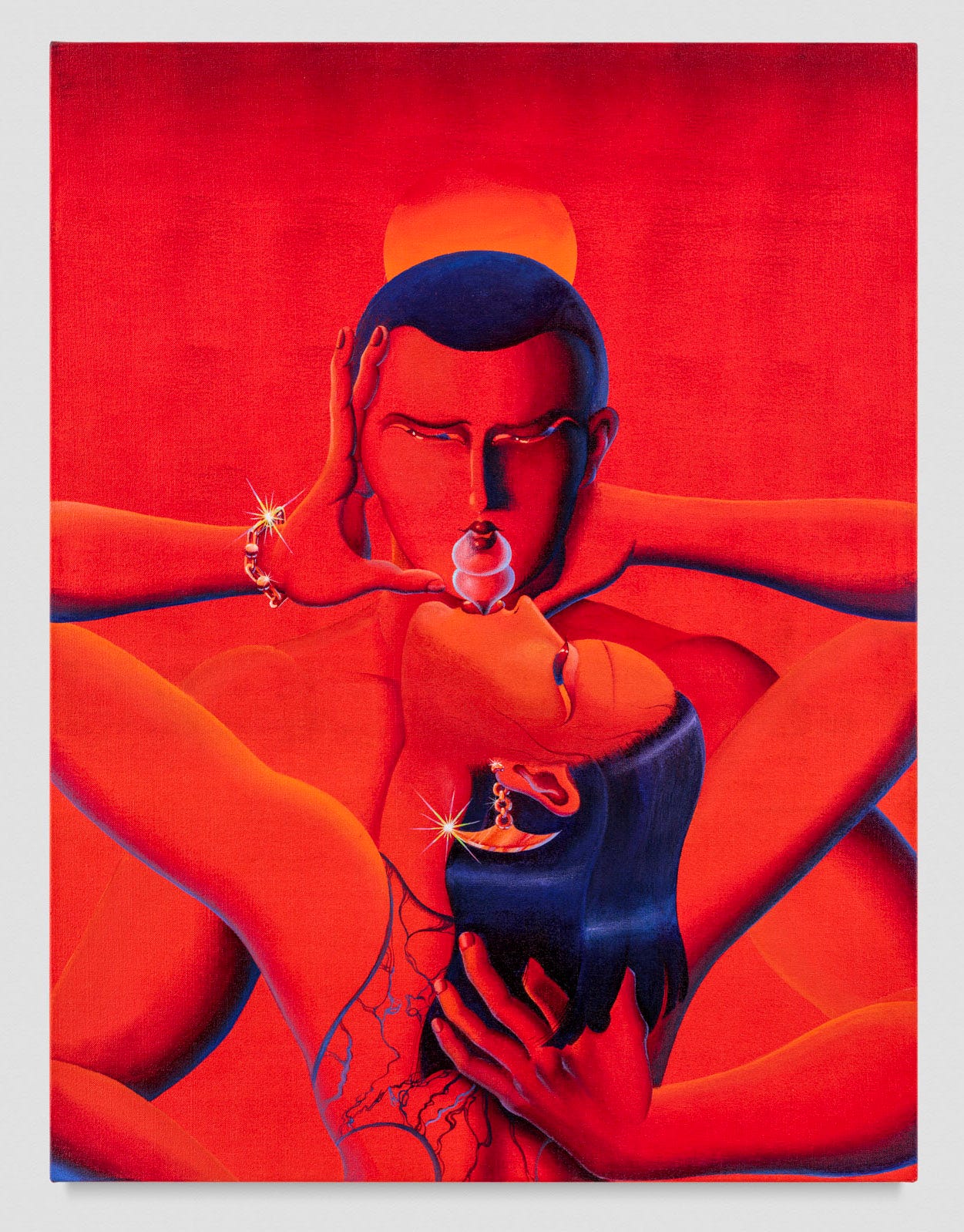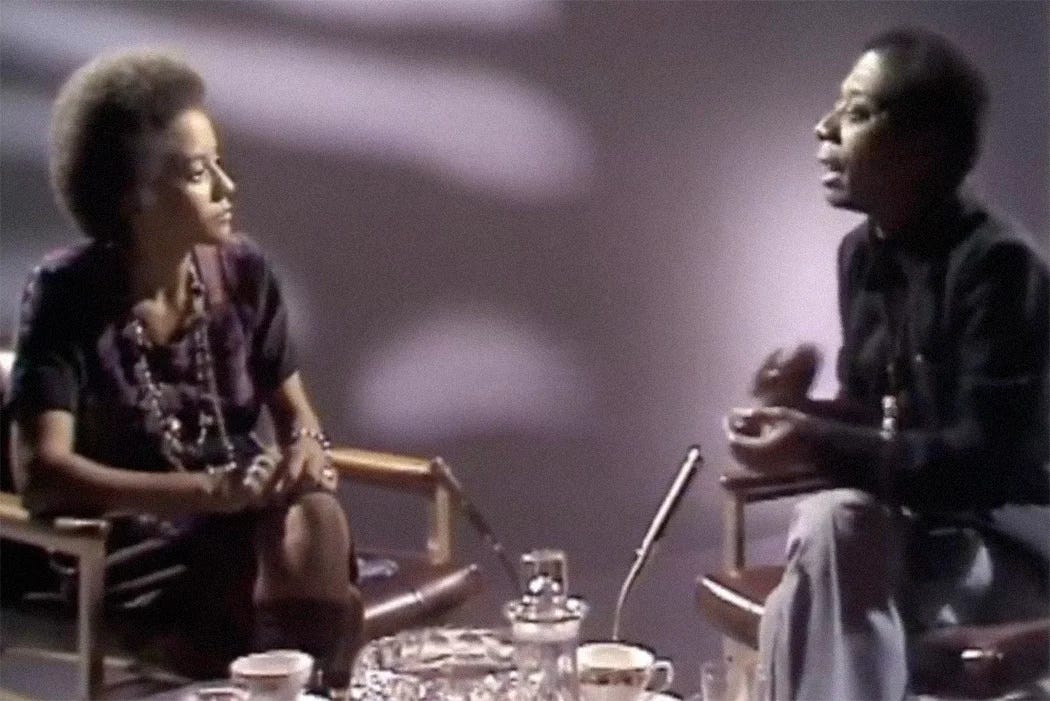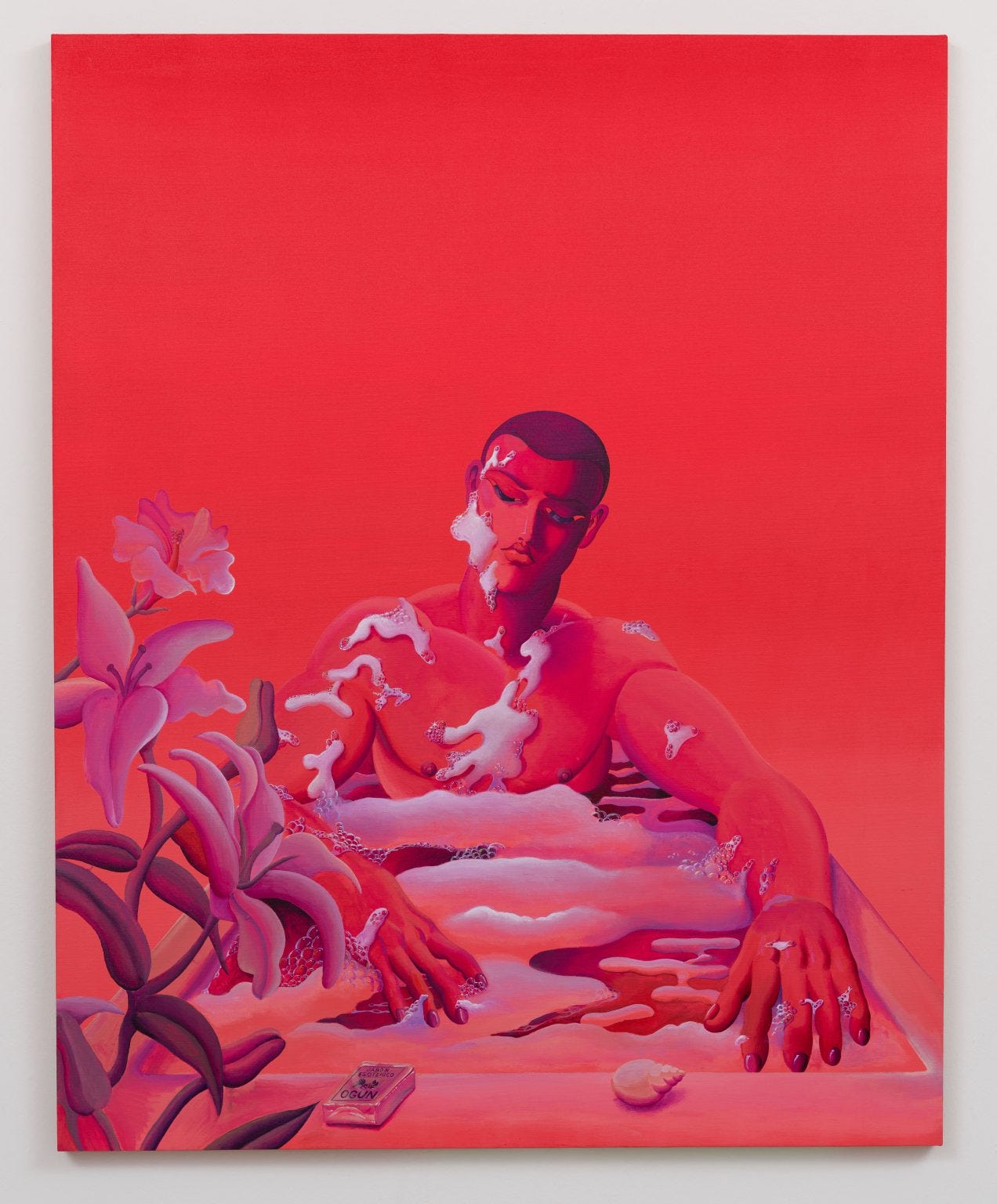LOOSEY turns one today. Enjoy this bonus essay to celebrate and start your off Valentine’s Day with a love note. Check out the most popular essays from the past year here.
What if I told you that Rosalía, Nikki Giovanni, and James Baldwin all believed that lying was a love language?
Not too long ago, I flew to Barbados to visit family. For weeks, I romanticized my return to the island by envisioning mornings at the beach, afternoon drives to the countryside, and the constant presence of Rihanna overlooking every intersection and institution I came across. Robyn Rihanna Fenty, whether it be her unlicensed image on beauty salon posters in Oistins or the sound of her music radiating from a car in the St. Lawrence Gap or simply her photobook in my uncle’s dining room, was omnipresent, much like the eyes of T. J. Eckleburg in The Great Gatbsy.
It is understood, or at least it was explained to me in English class, that the irises of the literary billboard represent the eyes of God, observing humanity, bearing witness to our morality and earthly sins. On the island, it was as though we were one nation under the watchful Rihanna, her sphinx-like eyes clocking our every move.
I was most excited to be reacquainted with the food. In my mind, I meticulously planned an eating schedule, consisting of visits to a renowned sports bars for rum punch and fish cakes, Friday night at a local fish fry for grilled dolphin (before you freak, ‘dolphin’ is what Bajans call ‘mahi-mahi’), convenience store runs for pineapple Ju-C and multiple trips to my beloved Chefette for the Chicken Leg Dinner (totally suitable to eat as a lunch).
Within hours of arrival, my family and I went to our favourite sports bar to chow down on the much-anticipated fish cakes. Although there was no need for a reservation, we made one in advance out of eagerness and ordered within seconds of sitting down without glancing at the menu.
“We will start with two orders of the fish cakes, a round of rum punches for the table and we’ll split the fried dolphin and flying fish special for dinner,” I confidently ordered with a false island twang. You see, I have this thing where if I visit a country where its inhabitants have any sort of accent, I adopt it like Angelina Jolie adopting a child. The Bajan accent came to me within minutes of the plane landing, embarrassing the crap out of all my relatives. Satisfied, giddy, and feeling like an ‘island gyal,’ I waited for the first taste of Barbados to arrive.
Upon receiving the rum punch, I was perplexed by its colour. It looked off, more amber than red. I was not satisfied after tasting it either, finding that there was not enough punch to suitably cloak the liquor. I placed the beverage to the side and grinned anyway. After many years, perhaps I misremembered what it tasted like.
However, when the fish cakes arrived I could no longer lie to myself.
The fish cake tasted more of dough than fish and, upon inspection, wasn’t cooked solidly. I grimaced, acknowledging silently that the sports bar, like men, had fell off. It would appear the watchful, omniscient eyes of Rihanna had witnessed the greatest sin of all: making fish cakes with little to no fish.
Despite my frustrations, I ate the whole meal, gaslighting myself into thinking that this was the way it always tasted. When the waiter came to our table to ‘check in on tings,’ I, too, committed a sin. I lied and told her it was delicious.
But exactly why would I lie to a stranger who I would never see again? Maybe, I lied because I loved the sports bar and didn’t want to dunk on a place I had been dining at my whole life. Perhaps, I lied because I loved Barbados and, despite our separation, wanted to believe that I still knew its hot spots. Or maybe, I lied to keep the dream alive that it was the best place on earth for fish cakes and rum punch.
Spanish singer-songwriter Rosalía proposes a thought on love and lying in her loosey “Lie Like You Love Me.” Over the signature Max Martin synths, the genre-bending vocalist coos on the chorus:
“I don't need honesty. Baby, lie like you love me, lie like you love me.”
Her idea that dishonesty can be virtuous and originate from love is something that is widely debated. bell hooks, as OG LOOSEY readers will recall, voraciously argued that deceit cannot exist in a truthful, loving relationship but, in my case, I felt as though lying was the only choice I had.
In today’s romantic junctures with the emerging prevalence of ethical non-monogamy (ie: open relationships), participating couples may establish rules where one partner can purposely omit the truth regarding their dalliances outside of their relationship. It is understood that this is done out of love and to protect the other partner’s feelings. In these instances, the couple must believe that if the truth was present, the relationship would fall apart. But with the omission of truth, what authentic relationship could have existed at all?
A similar question was interrogated in 1971, when a forty-seven-year-old writer named James Baldwin and a twenty-eight-year-old poet named Nikki Giovanni sat down for a televised “dialogue” in London, England. At the time, Baldwin had cemented his position as a predominant thinker and writer in America while Giovanni, despite being nearly twenty years younger than Baldwin, was well on her way to becoming a literary star in her own right with the emerging recognition of her poetry. During the discussion, the thinkers debate topics such as the role of the writer, the policing of Black individuals in white society, and, of course, love. My favourite segment of the discussion, and one that frequently goes viral, is where Giovanni expresses her attitude regarding honesty in relationships. Her buoyant and direct delivery leaves Baldwin dumbfounded in the following exchange:
Nikki Giovanni: “It takes two people to have a relationship. If you don’t have a dream, fake it.”
James Baldwin: “You can’t fake a dream.”
NG: “You’ve got to fake it because we don’t have dreams these days.”
JB: “If I love you, I can’t lie to you.”
NG: “Of course, you can lie to me and you will. ‘Cuz what the hell do I care about the truth for? I care if you’re there. What [does] Billie Holiday say? ‘Hush now, don’t explain.’”
JB: “Okay, I can accept that.”
NG: “What does the truth matter? And why you gotta be truthful with me when you lie to everyone else? You lied at that cracker [on] the job, right? Lie to me! Smile. Treat me the same way you would treat him.”
JB: “I can’t treat you the same way you treat him.”
NB: “You must! You must! Because I’ve caught the frowns and the anger. He’s happy with you. Of course, he doesn’t know you’re unhappy; you grin at him all day long. You come home and I catch hell. Because I love you, I get the least of you. I get the very minimum… Fake it with me.”
Despite the dishonesty Giovanni is willing to receive, her argument is ironically truthful. The young Giovanni, already polluted by love and life, speaks with sobering honesty. She prefers the softness that comforting lies can provide over the sandpapered edges of the truth. Of course, the context and time in which the conversation takes place cannot be separated from her argument. In the 70s, Giovanni is referencing the “love” Black people share with their white employers at work which, in her mind, is not afforded to their Black partners when they come home. In much of the world, beyond the 70s into today, minorities (women, people of colour, members of the LGBTQ+, etc) often have to mute themselves to appease the dominant class out of fear of becoming further marginalized. To Nikki, this ‘muting’ can be read as lying but it is expressed externally as a form of care. As love calls for us to bring truth to relationships, this form of care can sometimes be absent as we prioritize our internal truths over the care of our partners.
Close friends will know that I have a specific question that I ask when faced with a situation or person that I’m in conflict with: Would you rather be happy or would you rather be right? To be right means speaking my truth, risking temporary peace and comfort to shift the situation to be aligned with my perspective (read: the right perspective lol). When I choose to be right, it’s usually because I have the time to be right. It’s typically in situations when someone has fucked with the wrong Brendon at the right time. But choosing happiness can be sometimes more freeing, less messy, and maintain an equilibrium when I am already exhausted and worried that the truth may hurt someone’s feelings.
Unfortunately, this question isn’t a perfect science as there is also an argument that if I truly love you, I should want us to agree on what is right together and if I don’t care about you at all, I’m good with letting you walk around the earth being loud and wrong as long as it protects my peace. My thinking is aligned with this argument more often than not.
Ultimately, I believe that it comes down to intention. It’s said that “Honesty without kindness is brutality and kindness without honesty is manipulation.” The form of care that Giovanni seeks is of the same ilk as Rosalía’s sentiment, of the same family as omitting the truth in an open relationship, and of the same vein of the white lie I told in the Bajan sports bar. In these cases, we lie because we love.
Rosalía ends her chorus with a premonition. “Cover me in a dream… Maybe at the end, it becomes real еnough for me.” Is the dream Rosalía mentions the same dream that Giovanni implores us to falsify to have a relationship? The dream that Giovanni pessimistically argues does not exist ‘these days?’ And, if so, will the eyes of Rihanna still watch over our wasteland as we lie to each other to stay entangled in the deceitful dream of love?
In this life, only one thing can be certain: Rihanna sure as hell would not have turned a blind eye and lied about those fish cakes.
❤🔥 Happy Valentine’s Day! ❤🔥 FROM LOOSEY, WITH LOVE ❤🔥





